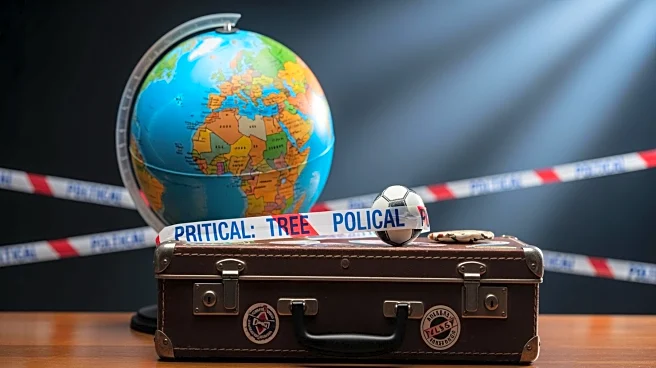What's Happening?
On October 23, 2025, the European Union announced its 19th set of sanctions against Russia, which includes a comprehensive ban on organized travel to the country. This measure prohibits European travel companies from arranging, selling, or promoting trips
to Russia, affecting both individual and group excursions. The ban is part of a broader set of sanctions aimed at Russia due to ongoing geopolitical tensions. The impact is significant, as travel to Russia from Europe has decreased dramatically, with only 65,950 European tourists visiting Russia in the first half of 2025, compared to 567,084 during the same period in 2019. The decline is attributed to the legal and logistical barriers now in place, including visa requirements and the absence of direct flights.
Why It's Important?
The ban on organized travel to Russia by the European Union is a significant development in international relations, reflecting the ongoing geopolitical tensions between Europe and Russia. This move is likely to have substantial economic implications for the Russian tourism industry, which has historically relied on European visitors. The sanctions could further isolate Russia economically and culturally, as European tourists are redirected to alternative destinations such as Georgia and Kyrgyzstan. The shift in travel patterns may benefit these countries economically, as they experience increased bookings and tourism revenue. Additionally, the sanctions underscore the EU's commitment to maintaining pressure on Russia, potentially influencing future diplomatic negotiations.
What's Next?
The enforcement of the travel ban includes heavy penalties for violations, with fines up to €510,000 and potential imprisonment for company directors in countries like Bulgaria. Other EU nations are developing similar penalties, and insurance providers are denying coverage for travelers to Russia. As travel agencies pivot to alternative destinations, countries like Georgia and Kyrgyzstan may continue to see growth in tourism. The long-term impact on Russia's tourism infrastructure could be significant, with a slow recovery expected even if geopolitical tensions ease. The EU's stance may influence other regions to adopt similar measures, further isolating Russia on the global stage.
Beyond the Headlines
The ban on travel to Russia highlights the broader geopolitical dynamics at play, with the EU using economic sanctions as a tool to exert pressure on Russia. This approach raises questions about the effectiveness of sanctions in achieving political goals and the potential for unintended consequences, such as economic hardship for ordinary citizens. The shift in tourism patterns also reflects changing perceptions of safety and accessibility in the region, with travelers seeking destinations that offer cultural experiences without the associated risks. The situation underscores the interconnectedness of global politics and economics, as decisions made by governments can have far-reaching impacts on industries and individuals.
















